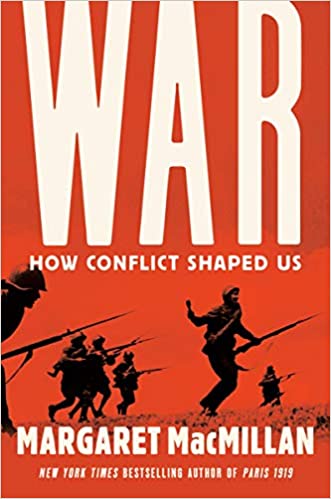War: How Conflict Shaped Us
A review of "War: How Conflict Shaped Us" by Margaret MacMillan

All Global Research articles can be read in 51 languages by activating the “Translate Website” drop down menu on the top banner of our home page (Desktop version).
Visit and follow us on Instagram at @crg_globalresearch.
***
I almost did not finish reading “War: How Conflict Shaped Us”. It is not worth reading, but I worked through it anyway. Which is unfortunate as Margaret MacMillan can be an excellent writer of history. The two volumes of hers that I have read – “Paris 1919” and “The War That Ended Peace” – are well written histories, readily accessible and valuable for all levels of readers. Unfortunately she errs right from the title on through to the lack of actually saying what shape we are in today as a result of all our wars.
Cultivation and language
The title suggests that war has shaped us, almost as if it is a natural force in a similar manner that economists argue the ‘free markets’ are a natural force. Both are human constructs, and when reading through the book it becomes apparent that the title should have read “War – How We Cultivate It.” Certainly it shapes us, but the preponderance of language used in its descriptions throughout the book indicate it is a culture: “improvement by training; intellectual development”, although I dare say to call war intellectual is a bit of a stretch, more a culture of rationalization. When something is cultivated it is “preparation to grow”, which in our culture is the preparation and growth of war, militarism, and its associated institutions and behaviours.
MacMillan’s choice of language fully indicates how humanity cultivates war. While discussing how war is supposedly shaping us, she uses the language of social cultivation, some words more severe than others. On the soft side, support for war is managed, legitimated, motivated, sanctified; on the harder side war is instilled, inculcated (from its roots to be trod on by the heel), manipulated.
She discusses “public opinion” as if the public has an actual say in determining the advent of war, but public opinion is mostly determined by the media of the day – just read some histories of Randolph Hearst and Edward Bernays among others. She also uses the term “public culture,” and in the same manner, public culture is formed mainly by the media: manipulated, managed, legitimated and even sanctified by corporate control.
The descriptor “unscrupulous” is used to describe demagogues and some of the military, but the word scrupulous indicates a person is “conscientious even in small matters, not neglectful of details, thoroughness, unfailing”. To be sure, demagogues and military personnel can be very scrupulous. Just because they are being destructive does not mean they do not have the “scruples” of the militarized mindset inculcated or sanctified internally.
Pot pourri
Beyond the title and subsequent language faults, the arguments concerning a chosen topic are poorly laid out. MacMillan uses lots of co-relations between war and its effects and influences but she does not establish any real causal relationships. She uses a pot pourri (from the French “rotten pot”) of facts and stories (myths, legends, and personal anecdotes, only the latter having some validity as descriptors of war in a personal sense).
Her supporting information for her shaky thesis bounces around in time and space and between fact and fiction. The mixture can be entertaining, but is truly only good for fans of arcane war trivia. In a sense there is a lot of history, but the reader cannot understand any one historical event or any historical flow from this melange of ideas.
And what is our current shape…?
The biggest failure of the book is to actually describe the shape of the world, or nation, or region, after all the wars that have “shaped us.” There is no coherent description of the current U.S. militarized state, its culture of war and its “shape” imposed, inculcated, cultivated, on NATO, the EU, Russia, China, Israel, terrorists, colour revolutions, civil wars, Syria, Iran and all the many other little wars used by the CIA/NSA/black ops in order to control U.S. hegemonic “exceptionalism” and “indispensability”.
No description is provided of the economic influences in the U.S. culture of war even though power, greed, and control, and the profits that derive from a militarized state have enormous impact on the lives of U.S.citizens and citizens of the world. The control of oil and its transportation supports the U.S. global reserve currency, the petrodollar, and has huge influences around the world but particularly in the Middle East, with Israel as compatriot in arms.
Racism and colonial settlerism are not addressed as part of the inculcating, instilling, and a whole lot of sanctifying (by the church, the state, and the media rationalizing why white folks can enslave and murder ‘other’ folks.) All empires, all military countries, all those seeking control, cannot do so without an ‘other’, without an enemy to motivate the masses into giving them more power and to ignore domestic problems.
How not to present a thesis
Unfortunately War: How Conflict Shaped Us does not properly shape a thesis, does not provide any convincing support (which it cannot do if the thesis is missing or shallow), and does not in any way answer the suggestion of the title of how we are shaped by it. Margaret MacMillan has done much better, and I would not recommend this book for anyone other than to those looking for a grab bag of historical events scattered over time and space…and perhaps as a study in how not to write a well presented idea.
*
Note to readers: Please click the share buttons above or below. Follow us on Instagram, @crg_globalresearch. Forward this article to your email lists. Crosspost on your blog site, internet forums. etc.
Jim Miles is a frequent contributor to Global Research.

